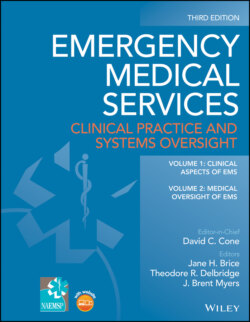Читать книгу Emergency Medical Services - Группа авторов - Страница 400
Refractory generalized convulsive status epilepticus
ОглавлениеDetailed management of status epilepticus is beyond the scope of this chapter. Benzodiazepines are the mainstay of initial therapy whatever the seizure type or cause, and lorazepam, if available, is often the recommended initial drug. Most reviews recommend doses in adults of 4–8 mg administered intravenously no faster than 2 mg/min. The possibility that the seizures are precipitated by an acute medical condition should be kept in mind and subsequently investigated.
Recommendations for second‐line drug lack strong evidence and most reviews and guidelines recommend one of several drugs including phenytoin or fosphenytoin, valproate, or levetiracetam [55–59]. The recently completed ESETT trial for benzodiazepine refractory status epilepticus suggested that these drugs were of equivalent efficacy [60]. While these agents are not generally available in typical EMS environments, they may be found in critical care transport situations and EMS physician response teams. There is a trend in recent guidelines to deemphasize barbiturates in favor of levetiracetam, fosphenytoin, or valproate.
Refractory status epilepticus may be defined as generalized seizures that persist through administration of optimal benzodiazepines and a second‐line drug. There are no prospective, randomized trials to guide third‐line therapy. Anecdotal reports and recommendations list a variety of other agents, including high‐dose phenytoin [57], lidocaine [61–64], etomidate [65], ketamine [66, 67], midazolam [68, 69], propofol [69–73], and valproic acid [74–76]. There is a trend in the literature to recommend propofol for refractory generalized convulsive status epilepticus that fails to respond to optimal benzodiazepine and a second‐line drug administration. Definitive airway management and blood pressure support will be needed with the use of many of these agents.
